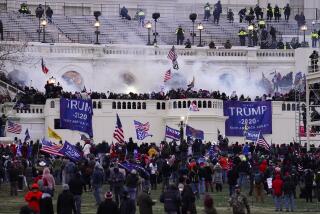Cash-Laundering Counts Dismissed in Narcotics Case
- Share via
Confirming the fears of prosecutors, a Los Angeles federal judge on Thursday dismissed the bulk of the government’s case against eight defendants accused of laundering $4 million in drug profits by converting the cash to cashier’s checks.
The decision by U.S. District Judge Consuelo B. Marshall was the first since a federal appeals court ruled last Friday that bank customers are not required to report cash transactions under $10,000, even if their purpose is to evade the law and move the money out of the country.
The U.S. 9th Circuit Court of Appeals issued the ruling in an Arizona case in which the judges said that making money hard to trace by keeping cash transactions under $10,000 violates no federal law.
Prosecutors said the ruling would render the federal Bank Secrecy Act--the government’s main weapon against the money launderers--useless. The act requires that financial institutions, such as banks, report cash transactions of $10,000 or more to the Internal Revenue Service.
Assistant U.S. Atty. Brian Sun underscored the government’s concern in a hearing before Marshall on Monday, arguing that individuals have the same responsibility as financial institutions to comply with the Bank Secrecy Act.
He also pointed out a major difference between the Los Angeles and Arizona cases. The defendants here, in some instances, allegedly obtained several checks from the same bank on the same day, with the total of the checks exceeding $10,000. In the Arizona case, the defendants’ cash transactions did not exceed $10,000 in any one-day period.
Marshall, however, disagreed and on Thursday threw out 19 money-laundering counts against the eight defendants in the Los Angeles case. She let stand a single conspiracy count to possess and distribute drugs against the eight.
The appellate ruling “clearly seems to apply to the facts of this case,” the judge said.
Defense attorneys said the government’s case now seems flimsy without the money-laundering counts.
“Jurors would be asked to make a tremendous leap in logic” if the government sought conspiracy convictions on banking transactions now found to be legal by the courts, said Los Angeles lawyer Anthony Brooklier. “I don’t think the government’s case on conspiracy is there.”
Sun, who insisted that the government’s case was still viable, said Justice Department officials in Washington would have to be consulted before a decision is made on whether to appeal Marshall’s ruling.
Ten people were indicted by a Los Angeles federal grand jury last July on charges that they laundered profits of cocaine traffickers by transferring checks--all under $10,000 but totaling more than $4 million--to bank accounts in Connecticut, New York and Miami in 1984 and 1985.
The accounts were controlled by South American drug smugglers, the indictment said.
Scheduled to stand trial Feb. 4 on the single conspiracy charge are William Edgar Murcia, 33, of Alhambra; Arturo Santiago Arocha, 35, of Diamond Bar; William Arias Mayor, 27, of Alta Loma; Arturo Vigil, 22, of Covina; Francisco Saenz Castillo, 31, of West Covina; Rene Francisco Galvez, 31, of Los Angeles; Fred Henry Coca, 53, of Los Angeles, and Oscar Edmund Murcia Jr., 35, of Alexandria, Va.
Ruby Vidal, 36, of Alhambra pleaded guilty to a lesser charge and was sentenced to six months’ imprisonment. Charges against a 10th individual, Katherine Marie Torres, 31, of Los Angeles, were dropped.
More to Read
Sign up for Essential California
The most important California stories and recommendations in your inbox every morning.
You may occasionally receive promotional content from the Los Angeles Times.










